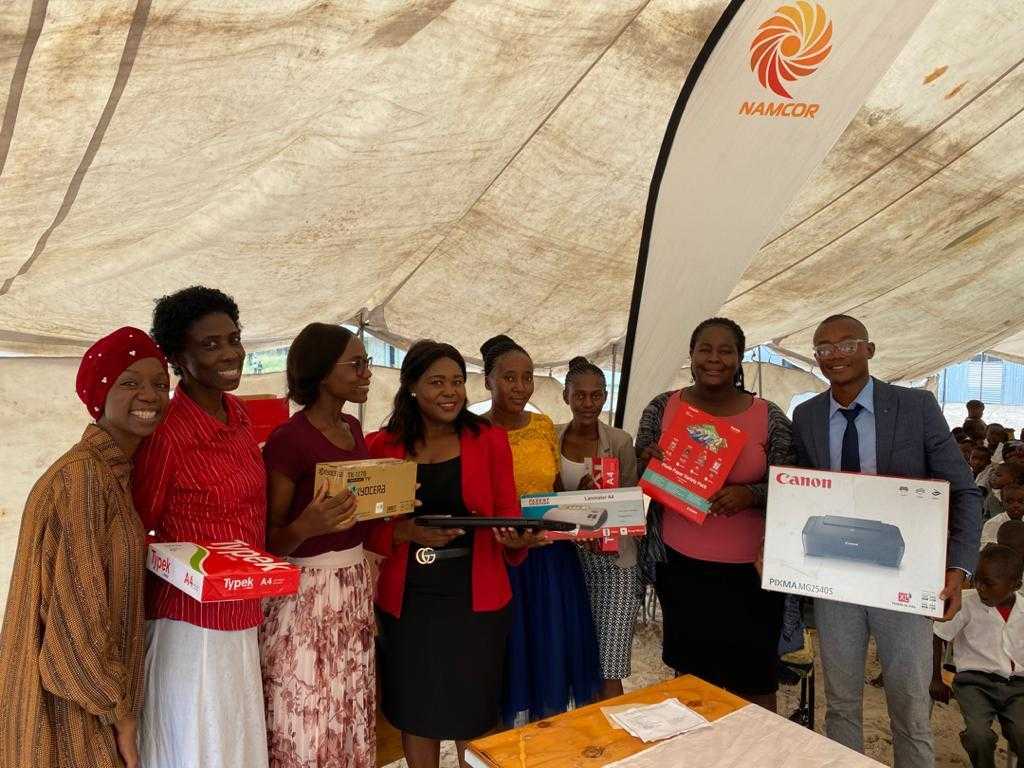NAMCOR contributed towards helping each and every learner enrolled at Natangwe Uugwanga Primary School, in the Oshikoto Region. The corporate entity donated several ICT equipments to the value of N$20,000.00.


NAMCOR contributed towards helping each and every learner enrolled at Natangwe Uugwanga Primary School, in the Oshikoto Region. The corporate entity donated several ICT equipments to the value of N$20,000.00.


Day 3: NAMCOR donated office equipment to assist with the setup of Xungileni’s computer classroom.
In the images: Ms. Negumbo, Mr. Hamutenya, and learners from Xungileni Primary School.


The Ministry of Mines and Energy announces that fuel pump prices will increase on 1st November 2017 at 00h01.
The OPEC-non-OPEC producing countries’ Joint Ministerial Monitoring Committee (JMMC) has said based on the report of its Joint Technical Committee (JTC) for September 2017 that OPEC and participating non-OPEC producing countries have achieved a record high conformity level with the voluntary production adjustments, reaching 120 per cent.
The JMMC was established following OPEC’s 171st Ministerial Conference Decision of November 30, 2016, and the subsequent Declaration of Cooperation at the joint OPEC-Non-OPEC Producing Countries’ Ministerial Meeting on December 10, 2016, at which 11 (now 10 after Equatorial Guinea became a Member of OPEC ) non-OPEC oil producing countries cooperated with the 13 (now 14) OPEC member countries in a concerted effort to accelerate the stabilization of the global oil market through voluntary adjustments in total production of around 1.8 million barrels per day.
The resulting declaration, which came into effect on January 1, 2017, was for six months. The second joint OPEC-Non-OPEC Producing Countries’ Ministerial Meeting, held on May 25, 2017, decided to extend the voluntary production adjustments for another nine months commencing from July 1, 2017.
In September 2017, the OPEC and participating non-OPEC producing countries achieved an excellent conformity level of 120 per cent, the highest level since the start of the Declaration of Cooperation. This again underscores the resolute commitment of participating producing countries to cooperate towards the rebalancing of the market.
The JMMC expressed satisfaction with the overall results and encouraged all participating countries to continue on the path towards conformity, for the benefit of producers and consumers alike.
The JMMC noted that while some participating producing countries have consistently performed beyond their voluntary production adjustments, others are yet to achieve 100 per cent conformity. The JMMC took note of the recent developments in the market and expressed confidence that the oil market is moving in the right direction towards the objectives of the Declaration of Cooperation.
Indicative of these positive developments are the recent upward revisions for global oil demand growth in both 2017 and 2018. The JMMC will continue to monitor other factors in the oil market and their influence on the ongoing market rebalancing process. All options are left open to ensure that every effort is made to rebalance the market for the benefit of all.
The results of the latest fuel price review indicate that the average Free On Board prices per barrel remained stable for ULP 95 and for both Diesel grades. Barrel prices for refined oil traded at an average of US$ 68.239 for ULP95, US$ 68.379 and US$ 68.800 for Diesel 500ppm and Diesel 50ppm respectively. The Basic Fuel Price Unit Rate Slate calculations for the past month recorded under-recoveries on all the price regulated petroleum products. The under-recoveries recorded are sufficient enough to trigger an increase in local pump prices.
The average exchange rate moved up from N$13.1485 to about N$ 13.5553 per US$ over the period reviewed. The depreciation of the N$ against the US$ coupled with the fact that there was no upward adjustment for October 2017 prices despite the under-recovery situation back then contributed to the higher under-recoveries recorded during the current period.
The latest Petroleum Activities Return (PAR) report indicates that oil companies are failing to generate sufficient returns on their investments in the petroleum sector and there is a need to adjust their margins to a level that would encourage sustainability and further investment.
The Ministry has, therefore, decided to increase the Industry Margin by 7 c/l from 84 c/l to 91 c/l on all the price regulated fuel products. The effective date for this adjustment is the 1st of November 2017.
The over/(under)-recoveries per product on the BFP import parity landed in Walvis Bay calculated as at 23 October 2017 are indicated below:
| 95 Octane Unleaded Petrol | 52.686 c/ℓ |
| Diesel 500ppm | 80.518 c/ℓ |
| Diesel 50ppm | 79.126 c/ℓ |
Fuel pump prices in Walvis Bay will increase as follows:
| 95 Octane Unleaded Petrol | increase by 40 c/l (retail) |
| Diesel (all grades) | increase by 60 c/l (wholesale) |
Thus,the new Walvis Bay pump prices will be:
| 95 Octane Unleaded Petrol | N$ 11.20 per liter |
| Diesel 500ppm | N$ 11.23 per liter |
| Diesel 50ppm | N$ 11.28 per liter |
Fuel pump prices countrywide will also be adjusted accordingly.
The Ministry of Mines and Energy has to announce that petrol and diesel pump prices for July will decrease on the 5th of July 2017, at 00h01.
The prices of both crude oil and refined oil have defied recent forecasts that were based on the OPEC agreement to cut oil production a few months ago. The expectations were that by June, the prices would be hovering above US$65 per barrel. For the past four months, the prices have not reached that threshold with June recording US$60 and US$57 for a barrel of refined diesel and petrol, respectively. These averages are not far from the preceding month’s averages of US$63 per barrel for refined diesel and US$60 for petrol.
The exchange rate between the Namibia Dollar against the US Dollar has also been favourable during the period under review. The average exchange rate for June 2017 was N$12.88 compared to May’s average of N$13.22. This means that importing fuel to our shore was less costly in June compared to the preceding month of May. Moreover, the cost for shipping oil tankers has also decrease in June as assessed by the London Tankers Broker, recording US$145.70 per metric tonne compared to US$151.30 in May.
When all the aforementioned cost elements were filtered through the local market, substantial over-recoveries were recorded. For the past few months consumers have not gotten a relief at the pumps because the results of the Basic Fuel Price model were not favourable. It is only fair that they get some relief this time around when the conditions are favourable.
The over-recoveries per product on the BFP import parity landed in Walvis Bay calculated as at 25 June 2017 are indicated below:
| 95 Octane Unleaded Petrol | 60.234 c/ℓ |
| Diesel 500ppm | 58.164 c/ℓ |
| Diesel 50ppm | 59.536 c/ℓ |
The present Walvis Bay fuel pump prices for the controlled petroleum products (Petrol & Diesel) are to be decreased as follows:
| 95 Octane Unleaded Petrol | 50 c/l Decrease (retail) |
| Diesel (all grades) | 50 c/l Decrease (wholesale) |
The current Walvis Bay pump prices are high and the new pump prices will be as follows:
| 95 Octane Unleaded Petrol | N$ 10.50 per liter |
| Diesel 50ppm | N$ 10.33 per liter |
| Diesel 50ppm | N$ 10.38 per liter |
Petrol and diesel pump prices at various inland destinations countrywide will also be adjusted accordingly.